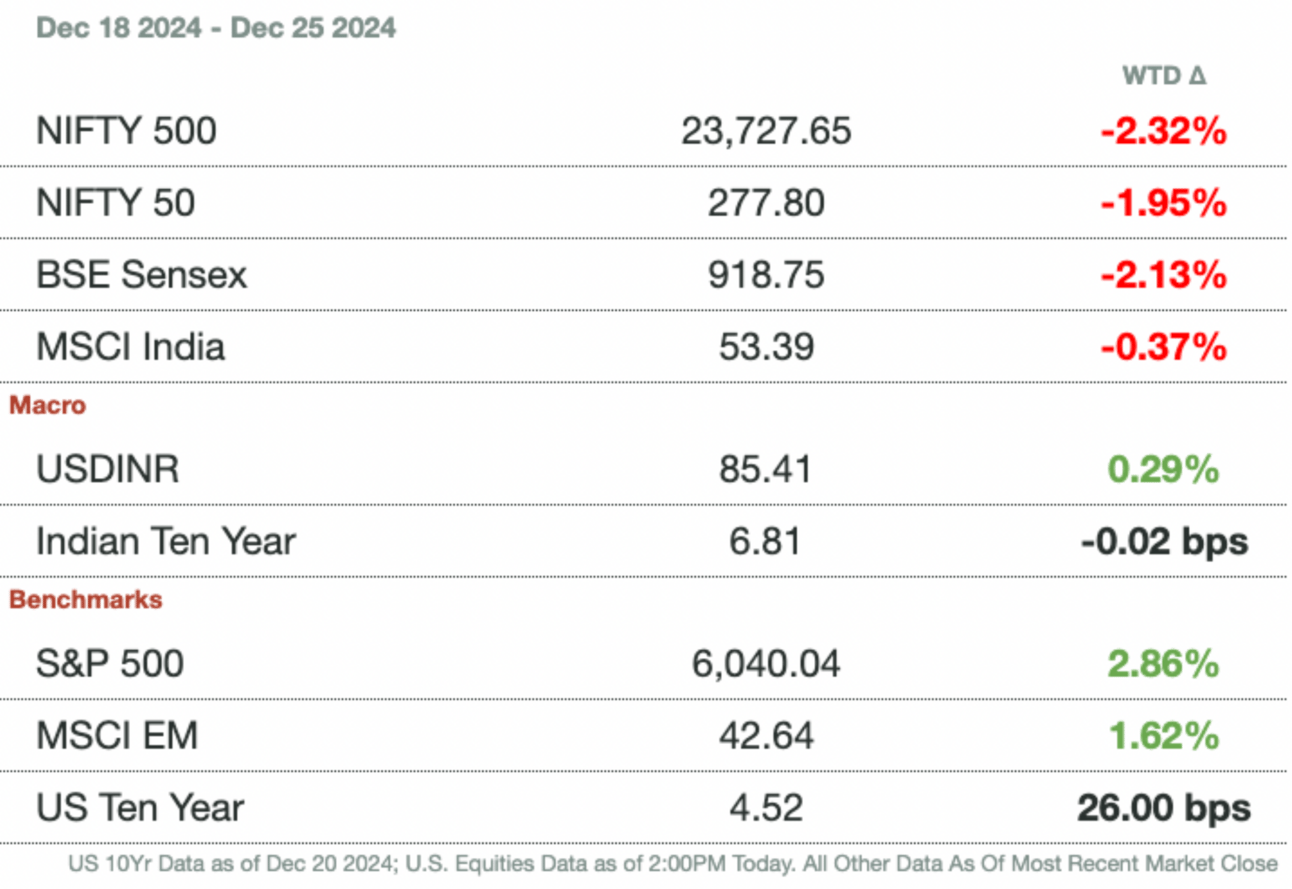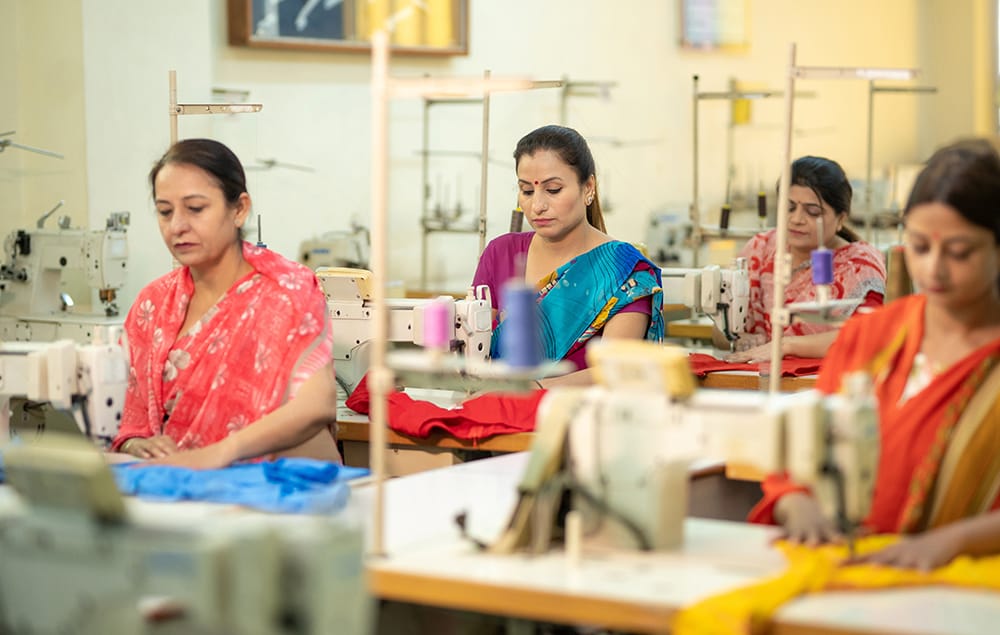
Welcome to Samosa Capital’s evening briefing — the best way to stay up-to-date on India’s financial markets. Merry Christmas and Happy Hannukkah! Here’s what’s in today’s newsletter:
International private equity firms are making big profits in India,
Small businesses are driving job growth,
And, the RBI believes India can still hit 7 percent growth.
Finally, we’ll close with Gupshup, a round-up of the most important headlines.
If you have feedback on our newsletter or just want to chat about India, always feel free to reach out to me. You can also share criticism about the newsletter anonymously here.
—Shreyas, [email protected]
Market Update

Live Event
Seats are running out for our upcoming “Future of India” expert panel and networking event on Wednesday, February 12, 2025, in New York City. Buy now here, or earn a free ticket by sharing Samosa Capital with three friends.
Private Equity Starts to Take Profits
Swiss PE firm Partners Group is reshaping its India investment strategy after achieving a remarkable fourfold increase in its portfolio value, now exceeding $8 billion (₹683.2 billion). Wow. The firm has been active in the Indian market for over a decade and is now looking to reinvest its profits into growing sectors such as healthcare, technology, and shadow lending.
Why the Shift? The firm has already made significant exits, including selling its 23 percent stake in retail chain Vishal Mega Mart Ltd., earning more than $3 billion (₹256.2 billion). Partners Group is also finalizing regulatory approvals to sell its 10.8 percent stake in mortgage lender Aavas Financiers Ltd. to Luxembourg-based CVC Capital Partners. The Aavas deal, valued at up to $164 million (₹14 billion), represents more than three times the firm’s initial investment.
Keep the money printer running: Partners Group is gearing up for the initial public offering of Ecom Express Ltd., India’s second-largest logistics solutions provider, where it holds a 40 percent stake. Although the firm intends to retain part of its investment in Ecom Express, it plans to offload shares worth $110.7 million (₹9.3 billion) through the IPO.
Despite India's public equity markets hovering near historical highs, private equity firms remain optimistic about long-term opportunities. In particular, the healthcare sector is consolidating while Indian software companies are creating new artificial intelligence solutions for a suite of new IT exports.
Small Businesses Continue to Lead the Way
India's small businesses created 11 million jobs in the year leading up to September 2024, with employment in manufacturing, trade, and services rising from 109.6 million to 120.6 million, according to a government report released Tuesday. However, wage growth in these sectors trailed inflation, highlighting ongoing economic challenges.

Small Businesses Are Hiring. The number of small manufacturing businesses —
mainly family-run enterprises like garment makers, auto component producers, and food processors — grew from 17.83 million in 2022-23 to 20.15 million in 2023-24. Overall, small businesses across manufacturing, trade, and services expanded from 65 million to 73.4 million during the same period.
This 12.84 percent growth in small businesses drove a 10 percent rise in employment, but limited wage growth tempered these gains amidst inflationary pressures.
The Wage Challenge. Average annual wages for hired workers in small businesses rose nominally by 13 percent to $1,656 (₹141,071). However, real wage growth was modest compared to an annual retail inflation rate of approximately 5.5 percent. Wages in these businesses, often located in rural areas and urban slums, remain well below the national per-capita income of $2,800 (₹239,120).
Finally, A Gosh Darn Rate Cut?
Economists anticipate the RBI will cut interest rates for the first time in February, following its decision to maintain the benchmark rate at 6.5 percent during the December meeting. Bond yields began the week slightly lower, influenced by RBI minutes signaling a potential February rate cut. Achala Jethmalani, an economist at RBL Bank, told Bloomberg she expects the February cut, citing rising concerns about economic growth. Similarly, Aditya Vyas, chief economist at STCI Primary Dealer, expressed the same outlook in an interview with The Economic Times.
Stressed out: In case you needed a reminder, India's GDP growth slowed to 5.4 percent in the July-September quarter of the 2024-25 fiscal year, marking a seven-quarter low and falling short of the RBI's projected 7 percent. Yet, inflation clocked in at 5.4 percent in November, beyond the RBI’s 4 percent target but within its 2 percent tolerance range. Expect RBI staffers to get a few more gray hairs in the coming months.
Gupshup
Macro
QState oil refiners struggle to hold enough Russian crude supply due to dropping cargo shipments. Executives from Indian Oil Corp, Bharat Petroleum, and Hindustan Petroleum said they were unable to procure the 6 million spot barrels they sought. Spot barrels reflect shipments for the current or very next month. The two likely explanations are (1) the Rosneft-Reliance deal which will soak up lots of production (2) Moscow limiting sales to favor long-term production contracts which can be more lucrative.
The Middle East's share of Indian oil imports is at a 9-month high. India imported 2.28 million barrels per day in November which is 10 percent higher than October and composes 48 percent of all energy imports. Russian oil imports have now fallen to 1.52 million barrels per day amid difficulty getting spot arrangements.
Banks are lobbying the RBI to switch the repo rate from MIBOR to SORR. MIBOR is the current swap rate and is based on uncollateralized trades that are liable to market collusion. Similarly, the US used LIBOR until market collusion was found causing a switch. SORR would be based on market transactions which, according to the bank consortium, would lead to better price discovery. Additionally, market transaction volume for uncollateralized agreements has fallen since LIBOR was switched to SOFR in the US.
Various bank economists expect the first interest rate cut in February. It’s starting to become a consensus pick in terms of timing since it will be the first meeting with 5 new MPC members plus an extra 3 months' worth of data to back up any rate changes. The RBI is expected to pay close attention to the winter harvest numbers plus how growth continues to evolve after a disappointing 5.4 percent quarter.
Poor weather is expected to reduce sugar production to 27 million metric tons and kill export hopes. Weather analysts now predict that sugar production will fall from 32 million tons in 2023; the larger issue is that annual consumption is 29 million tons which would require imports to be placed. Excessive droughts in the summer reduced the sugarcane yields.
The rupee's slip has been exacerbated by importers and a weak yuan. Strong dollar bids from importers have risen due to end-of-month payments even with state bank dollar sales. The weak yuan is another indicator of dollar strength over Asian currencies which has led to momentum still swinging against the rupee.
Equities
SEBI ends a 10,000 percent rally for Bharat Global Developers over fake revenue disclosure. The company was announcing forays into defense, aerospace, and agriculture using fake disclosures about high-marquee orders from companies like Reliance, Tata, and McCain India Agro. SEBI fully halted trading in the company after finding $31.7 million (₹2.7 billion) of insider selling as soon as the IPO lock-up period ended.
Global funds are shifting holdings from EM to US SMID (small and mid) caps in droves. Elara Capital data shows that last month alone had $78 billion (₹6.6 trillion) worth of US equity inflows. Historically, a shift to American SMIDs has spelled worse Indian returns since US SMIDs are a high-return substitute for Indian holdings.
Alts
Indian aviation is expected to grow through more airports and planes. Domestic air traffic is expected to rise to 170 million passengers by March 2025. To handle greater capacity, 2 new airports in Mumbai and Delhi are going to ease congestion. Airlines have also invested in hundreds of new aircraft from Boeing and Airbus as well to become more competitive internationally.
The NTPC inks a pact to set up more green hydrogen plants in Odisha. NTPC is working with GRIDCO (a national energy grid management organization) and CRUT (a public transportation agency) to create clean fueling systems and hydrogen buses.
The JNPA is collaborating with Swiss TIL to invest $2.4 billion (₹200 billion) in Vadhavan ports. The ports are being developed by a joint venture called VPPL, in which JNPA has a 74 percent stake. The Vadhavan project is meant to transform the Maharashtrian port into a world-class facility for exports and imports off of the west side of India.
Policy
The US FDA is restricting 11 Viatris drugs made in India. The FDA served a warning to Viatris regarding a facility in Indore. Viatris has immediately implemented a remediation plan, though specifics have not been released.
Bangladesh requests former PM Hasina be returned from Delhi for judicial processes. Ties between India and Bangladesh have become fraught since the Bangladesh government was overthrown and Hasina found refuge in India. New Delhi has reiterated that Hasina came to India for safety reasons but interim PM Yunus is adamant that Hasina must be returned to Bangladesh to be tried for her crimes in order for India-Bangladesh relations to resume normalcy.
See you Friday.
Written by Yash Tibrewal. Edited by Shreyas Sinha.
Disclaimer: This is not financial advice or recommendation for any investment. The Content is for informational purposes only, you should not construe any such information or other material as legal, tax, investment, financial, or other advice.